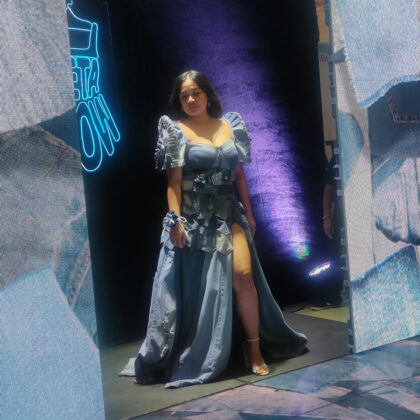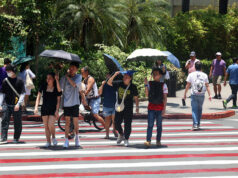QC holds scrap textile fashion show
A MALL fashion show isn’t always on the top of our list for excitement, but such an event in SM Novaliches on April 26 proved to be meaningful and interesting.
Enter Retashow: QC’s Walk to Sustainability, a fashion show that used textile scraps, as Quezon City’s activity for April’s Earth Month, just a few days away from the actual date of Earth Day, April 22. Each piece from the 20 candidates had to be made of at least 70% recycled textiles. The contest was judged by designers Zarah Juan and Eric Pineda and fashion social entrepreneur Pamela Mejia.
The show was a way to promote the Kilo/s Kyusi Store, an initiative by the Quezon City local government that takes a page from Paris’ thrift stores, where secondhand clothes are sold by weight. Aside from making use of what could have been textile waste, proceeds from the store go towards the city’s Learning Recovery program, where public school students with difficulties in math, reading, and science, are tutored by retired public school teachers and returning overseas Filipino workers (OFWs). This is in response to the 2022 Learning Poverty Report by the World Bank that said nine out of 10 Filipino children aged 10 years old are unable to read simple text. “We give jobs, education, and save the planet,” said Quezon City Mayor Joy Belmonte to BusinessWorld after the show.
Back to the show: a lot of the clothes were very impressive. Designer Mark Jay Panganiban’s outfit, for example, used denim scraps to create pants and a bustier, topped off with a coat made from an old blanket. Another impressive piece was Juan Miguel Rosario’s, making a coat and a handbag with recycled bows. It reminded one of a piece by Moschino, and we wouldn’t have guessed that it was made of scrap.
Three winners were awarded that evening. John Montecalmo got 3rd Place for a pink balintawak made with the Filipino technique of weaving cloth scraps to make cleaning rags and rugs. Maricris Pabelico got 2nd Place for another modified Filipiniana dress, this time made of denim scraps. A skirt, also made of denim, unfolded as a cape, bearing a message (which unfortunately we failed to catch, but it was something about the Earth).
A similar denim outfit by Renegade Limpin — a halter top and skirt combo made of denim scraps — won 1st Place, and got the designer P100,000. Mr. Limpin cleverly used only the waistbands of the former jeans to make the skirt for a trompe l’oeil effect, and matched this with a denim bag that bore the words “No to Fast Fashion.” But, as the model glided across the runway, she took off the skirt to reveal that it was also a very well-constructed jacket.
Ms. Belmonte outlined other sustainability initiatives by the Quezon City government in a speech, including Trash to Cashback, an incentivized recycling program, and refilling hubs to help curb the use of plastic sachets. In a mixture of English and Filipino, she said, “The bad effects of plastic are not just statistics, but actual experiences of each of us.”
The mayor also promotes textile recycling because of the concerns about fast fashion, which creates clothes at a fast rate to satisfy constant trend changes — creating a lot of waste as a result.
Ms. Belmonte cited data from the Ellen MacArthur Foundation, saying that a truckload of clothes and used textiles are thrown away in landfills or incinerated every second. “Textile is becoming the new plastic,” said Ms. Belmonte. “Bawal po ang plastic sa Quezon City,” she said, talking about City Ordinance 2868-2019, which banned plastic bags in the city. “Pinapaalala ko sa inyong lahat. Kaya sana ang pati ang mga katabi natin ay hindi plastic (I’m reminding all of you. I hope that the person sitting next to you isn’t a fake),” said the mayor, cracking a joke. — Joseph L. Garcia







